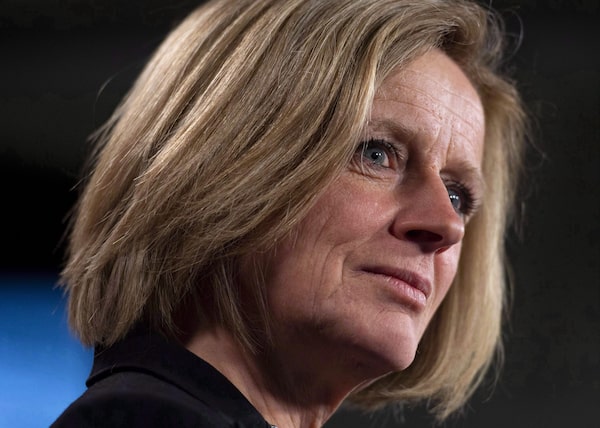
Alberta Premier Rachel Notley speaks during a news conference on Parliament Hill in Ottawa on April 15, 2018.Justin Tang/The Canadian Press
Premier Rachel Notley says she does not agree with the University of Alberta’s decision to grant an honorary degree to high-profile oil sands critic David Suzuki.
But she says the university is built on academic freedom and independence, and that must be respected.
“I’m not a big fan of this decision,” Ms. Notley said on Wednesday, adding she attended the university. “If I’d been on the [university] senate, I wouldn’t personally have voted for it.
“It struck me as being a bit tone deaf, but academic independence, university independence is important. So they have made that decision, they will defend that decision and that’s the way it should work.”
Mr. Suzuki is to receive an honorary science degree on June 7, but the award has prompted a flood of complaints, along with critical public letters from the university’s deans of business and engineering.
One Calgary law firm announced it was cancelling its annual $100,000 funding commitment to the university’s law school.
Mr. Suzuki, a long-time environmentalist and host of The Nature of Things television show, has called for Alberta’s oil sands to be shut down. He has not responded publicly to the controversy. His foundation has said the honorary degree is not a blind endorsement of all Mr. Suzuki’s beliefs, but rather a tribute to his lifetime of work.
Ms. Notley avoided criticizing Mr. Suzuki directly, but said her government’s efforts to find a middle ground between economic progress and environmental sustainability are undermined when the debate becomes extreme.
“As long as you allow that debate to be polarized, you ensure the failure of both objectives,” she said.
The Opposition United Conservative Leader Jason Kenney said the university should not honour Suzuki, “a man who makes millions off of defaming the livelihood of hundreds of thousands of Albertans.”
Mr. Kenney’s party has launched a petition to urge the honorary degree not be granted.
But university president David Turpin said this week the school stands by the decision, noting that knowledge and progress are built on the free exchange of ideas, no matter how uncomfortable some of them may be.
“Many alumni, donors, and friends have asked me to reverse the decision. They have let me know that their financial gifts and partnerships with the university depend on it,” Mr. Turpin wrote in the letter. “Universities must not be afraid of controversy. Instead, we must be its champion.
“Take uncomfortable ideas, debate, and conflict out of the university and its fundamental role in society disappears.”
The debate over the degree is set against the backdrop of Alberta fighting to get more of its oil to market, arguing that lack of market access and pipeline bottlenecks are costing Canada $40-million a day.
Alberta is pinning its hopes on an expansion of the Trans Mountain pipeline to take more oil from Edmonton to the British Columbia Coast.
The $7.4-billion project was given the green light in 2016 by the federal government but the operator, Kinder Morgan, says it is reconsidering given opposition in B.C.
The line, which would triple the amount of oil heading to tankers on B.C. Coast, has faced court challenges and permit delays. The B.C. government says it is concerned about the environmental consequences of the expansion on its coastline and inland waterways.